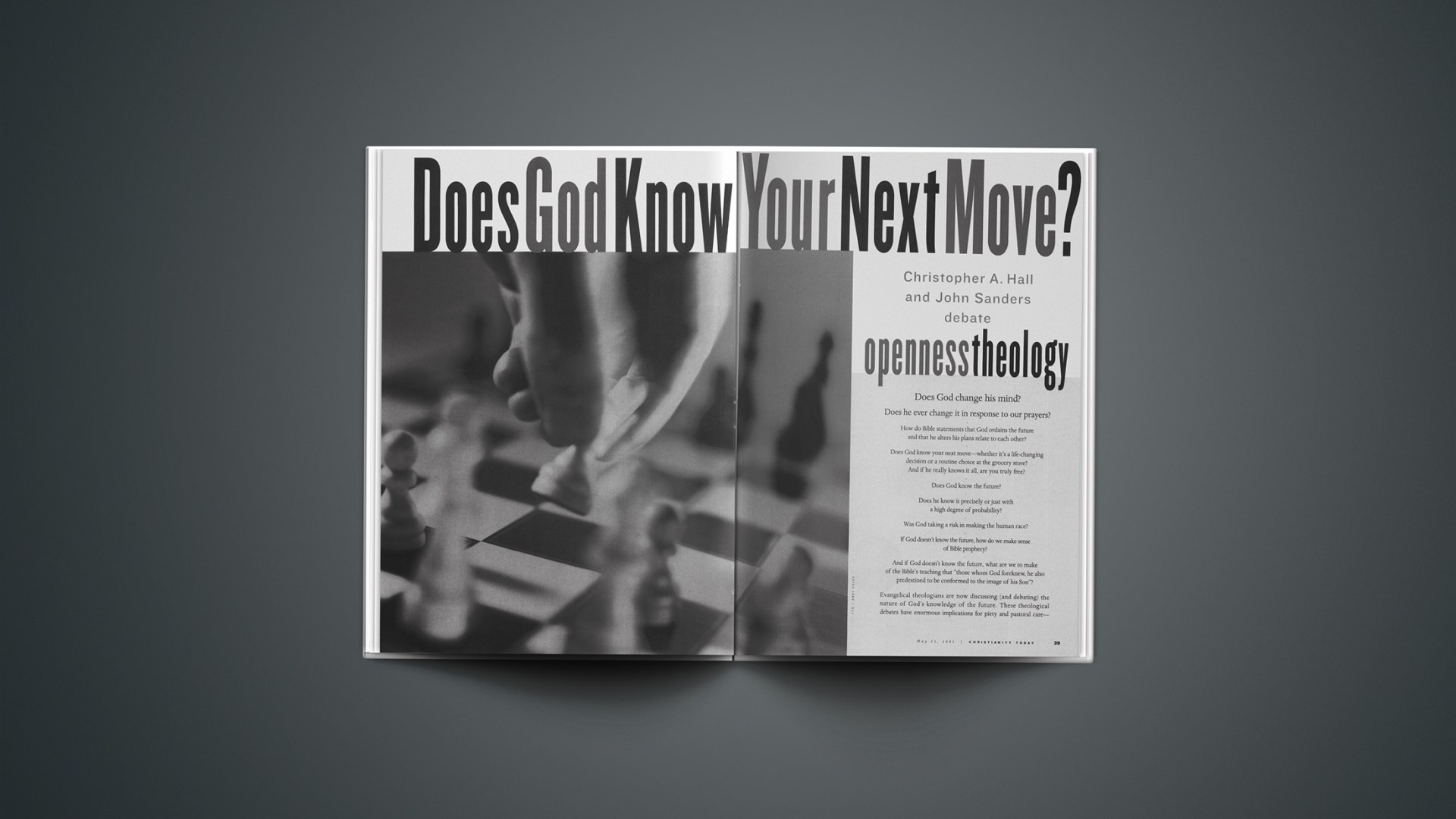Introduction | John Sanders 1 | Chris Hall 1 | Sanders 2 | Hall 2
Part 2:
John Sanders 3 | Chris Hall 3 | Sanders 4 | Hall 4 | Sanders 5 | PostscriptDear Chris,
Thank you for your thoughtful and challenging remarks. Your wisdom is valuable to me. Theology is, and always has been, produced in dialogue and I’m delighted to be in conversation with you.In response, let me say that I agree that “In Jesus Christ, God has spoken against evil and sin.” This is no small agreement! Jesus is God’s definitive response to our evil, demonstrating the divine love toward us. I agree that God “allows” evil to occur and that God has “acted against that very same evil.” However, you, as a classical theist, and I, as an open theist, disagree on the role of evil in God’s plans. Since you believe that God cannot change in any respect, cannot be affected by us in any way, and that God meticulously controls everything that happens, you have to say that every evil that occurs is part of God’s plan and that each and every evil is for the good. Given this, I wonder how you can claim that God acted “against” the very evil he ordained in the first place. Do you have a schizophrenic God? According to your view, nothing happens except what God specifically wants to happen, so God never takes risks, and his will is never thwarted in the least detail. Hence, you are forced to deny that God genuinely grieves over our sin (Gen. 6:6) since it makes no sense to say God grieves over what he wanted to occur!
Moreover, if God never responds to us, then you must affirm the doctrines of irresistible grace (we cannot reject God’s will) and unconditional election (God chooses those who are saved without responding to anything the saved do). Of course, you may simply appeal to “mystery” and say we cannot understand God’s ways. To that I say, “A contradiction by any other name is still plain nonsense.”
You claim that I subject Scripture to the demands of human logic. Actually, we all use human reasoning when reading the Bible—I do assume you understand at least parts of it. Moreover, your view is not so “mysterious” as you suggest. To claim that divine sovereignty and human freedom are contradictory, one must give the terms precisely opposite meanings. However, you do not, since you believe God micromanages everything such that his will is never thwarted and humans are “free” to act on their desires, but they do not have the freedom to do otherwise than they do. That is, you affirm “compatibilistic freedom” (determinism and human responsibility are compatible). In your view, all God has to do is ensure we have the desires he wants us to have and then we will “freely” do what God has ordained. There is nothing contradictory or logically mysterious about that! However, we, along with the “Arminian” tradition, believe that God does not tightly control everything and that humans have “libertarian freedom.” We have the freedom to do otherwise than we did (e.g., a murderer could have refrained from murdering), and we can thwart some of God’s will.
Moving on, we believe that God’s knowledge of the future is partly fixed and partly left open for three main reasons. First and foremost, we believe the Scriptures teach this (e.g., God grieves, changes his mind). Second, though we agree with Arminian theology on all but two points, we believe that complete foreknowledge of our future decisions implies the loss of our free will. Third, the “future” does not yet exist so there is nothing “there” to be known. Hence, you incorrectly state our view when you say we believe that “God’s knowledge of the future is limited.” We believe that God knows all that can be known, and to say that it is a limitation for God not to know “nothing” is ridiculous.
Finally, you beat on us with the club of the church tradition. Nearly everyone has said God possesses complete knowledge of what humans will do in the future, so how can we even think of going against such a cloud of witnesses? To begin, theologians have debated the nature and content of God’s omniscience for millennia. There are several traditions regarding exactly what God knows.
Second, we do respect theological traditions: to disagree with the great theologians of the past is serious business. Nonetheless, like Luther we feel compelled to affirm our view because of Scripture and sound reason. You sound just like John Eck, the Catholic inquisitor of Luther, who claimed it unimaginable that so many theologians could have been wrong on so central a teaching as salvation. I would have thought that someone such as yourself, teaching at a Baptist college, would have more empathy for those who challenge certain traditions. Lutherans, Reformed, and Catholics killed Anabaptists for espousing beliefs that most evangelicals today take for granted. Clearly, Protestants believe that traditions sometimes need changing. After all, it was not until the 18th century that challenges arose to the virtually unquestioned tradition that all unbaptized children (or those born of non-Christian parents) who die are damned to hell!
However, proponents of openness do not reject the entire tradition. We affirm the ecumenical creeds, the main teachings of the Reformation, the authority of Scripture, and the importance of prayer and community.
Blessings on your ministry trips overseas, and I look forward to hearing from you.
John
Chris Hall replies, next page.
Copyright © 2001 Christianity Today. Click for reprint information.










